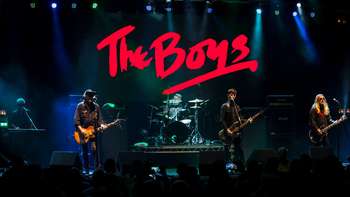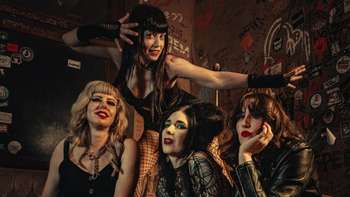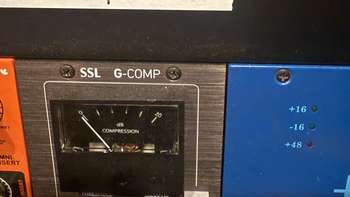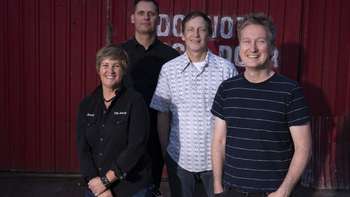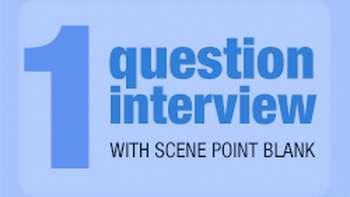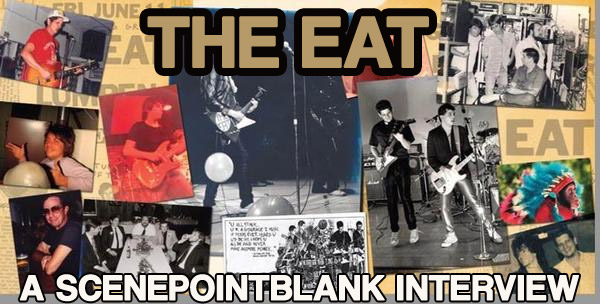
I first fell in love with The Eat upon seeing them live in Miami, FL at their 1996 reunion show. I had heard plenty of buzz about them from locals such as Los Canadians and The Crumbs, but nothing could prepare me for the ebullition that occurred as they returned in top form while several generations of South Florida punks sang along to every word. The arrival of the much-anticipated It's Not The Eat, It's The Humidity collection has been cause for celebration as you will be hard-pressed to get your hands on a copy of most of their releases without paying top dollar. Hell, their Communist Radio single is arguably the holy grail of the Killed By Death series.
Scene Point Blank recently had the pleasure of discussing the origin and early reactions to the band, the new Alternative Tentacles collection, and a whole lot more with The Eat vocalist and guitarist Eddie O' Brien.
Scene Point Blank: What would you say some of your influences were growing up that worked their way into The Eat sound?
Eddie O' Brien: General stuff of the 60's. We listened to The Beatles and all of that stuff. Jefferson Airplane and The Byrds and all that. The punk rock groups that were out, The Clash, The Ramones and The Jam and a handful of others, they were kind of considered our contemporaries or something and I don't think we were really influenced too much by them.
Scene Point Blank: So a lot of the influences were 60's rock stuff?
Eddie O' Brien: Yeah, I guess, because we were all twenty-five/twenty-six when we were doing the group; my brother was a little younger, but Chris and I had been in cover bands and hippy bands and all of that stuff before.
Scene Point Blank: Was The Eat your first original musical project together?
Eddie O' Brien: Yeah, well we were in other bands in the early 70's, (Chris and I) that did some original material.
Scene Point Blank: I know you've talked about how difficult it was to get gigs playing original material at that time. Did early Eat shows feature cover stuff?
Eddie O' Brien: Yeah. We just couldn't even really believe that we could get away with it at that point. But we were able to get away with it, playing all originals eventually.
Scene Point Blank: What were early reactions to the band like?
Eddie O' Brien: I think one of the first gigs we played was at this bar in Miami Beach called the Irish House and on our first record that we put out, the Communist Radio record, there was an actual note that was passed up to us that we should die. I can't remember the exact words. If Texas ever heard you, you would be hit. I hope you all die and never make any more money. Yeah, nobody liked us. Nobody really liked us that much the whole time. We had maybe a hardcore of about maybe forty or fiifty people around town, and we had a few gigs we played for pretty big crowds, but we played plenty of gigs where there were twelve people there. Maybe even the majority.
Scene Point Blank: With the growth of punk and hardcore there seems to be a really established community and I think it's a lot easier for everyone doing stuff now. During The Eat's time did you guys feel part of a punk community?
Eddie O' Brien: I think so. There were maybe a half a dozen other bands and we were all friends and we all played together and we were friends outside the clubs and stuff. And there were maybe about fifty people that did other stuff and just regular fans and stuff. But it was small. Real small. Not like other cities I don't think. Not like L.A. or New York or San Francisco or anything.
Scene Point Blank: You guys did limited touring right? How many tours did you actually end up doing?
Eddie O' Brien: We only really did one. We went out of town?we went to Tampa a few times and then we did one where we went up to NYC and a bunch of places in between, but it was really only one.
Scene Point Blank: How did that tour go? Were the reactions strong outside of Florida?
Eddie O' Brien: Yeah, it was pretty good. At that time we kind of had friends in these other cities that had been turned on to us in Atlanta and up in North Carolina, so there was maybe at least a dozen people in each city who already knew who we were. It was fun, but we were all working straight jobs at the time and we knew that this was just going to be a two-week thing and then we'd be back and going back to work. There was never any serious thought of doing it full time. I mean, how could you? I had kids, what am I going to do, come home with twenty bucks and say we'll I got three free beers. For me anyway, there was never really any thought about quitting a day job or anything.
Scene Point Blank: Who were some of the other bands of your era from Florida that never really got there due, but put out some great stuff?
Eddie O' Brien: One band, the Reactions, they were real good. And the Cichlids were a band that had a record out on a semi-major label. They were good. And Charlie Picket who we used to play with a lot, he got signed by Twin/Tone Records in Minneapolis and he spent about five or six years touring and his records are real good. Peter Buck produced one of his records. But he just got up to AA/AAA, he never got into the major leagues. And I play with Charlie now around town. I play bass for him in his group. We play three or four times a year. There are tons of other groups, but I can't remember right now. And groups that existed for a little while and broke up and all of that.
